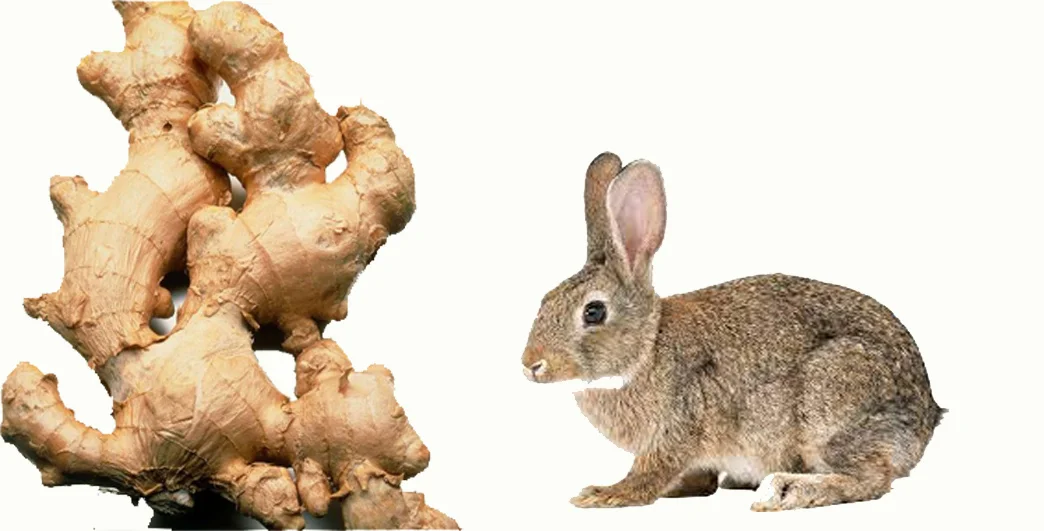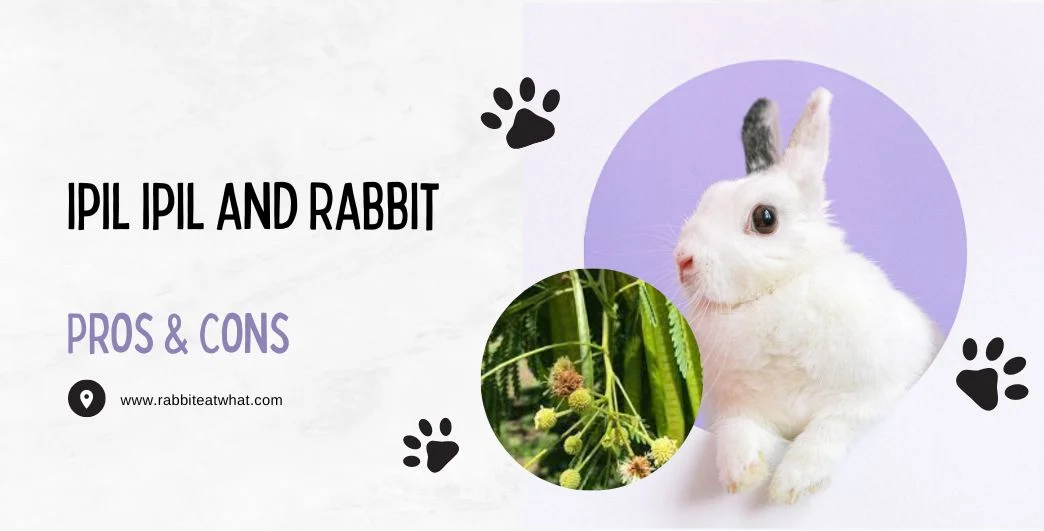The rabbits have specific dietary needs, so it’s crucial to be well-informed about what foods are safe and beneficial for them. One such item that often sparks curiosity is ginger. In this blog, we will explore whether rabbits can eat ginger and provide insights into how to ensure your bunny’s health and well-being.
The Rabbit’s Diet – Can Rabbits Eat Ginger?
Rabbits are herbivores, meaning their diet consists mainly of plant-based foods. A balanced diet for a rabbit primarily includes hay, fresh vegetables, and a small amount of pellets designed specifically for rabbits. These little furballs thrive on fiber-rich foods, which are essential for maintaining proper digestion and preventing dental issues.
Ginger Overview
Ginger is a flowering plant widely recognized for its distinct flavor and medicinal properties. It is often used as a spice in various cuisines and is known for its anti-inflammatory and digestive benefits for humans. However, when it comes to offering ginger to our rabbit friends, we need to exercise caution.
Can Rabbits Eat Ginger?
While small amounts of ginger might not necessarily be toxic to rabbits, it is not an ideal part of their diet. Rabbits have sensitive digestive systems, and introducing unfamiliar foods can lead to stomach upset, diarrhea, or even more severe health issues. Moreover, ginger contains certain compounds that may not sit well with your bunny’s delicate gut, potentially causing discomfort.
Potential Health Risks
Gastrointestinal Disturbances: The natural spiciness of ginger can irritate a rabbit’s digestive system, leading to diarrhea, bloating, or gas. These symptoms can cause significant discomfort and distress for your beloved pet.
can rabbits eat ginger leaves
1. Potential Benefits of Ginger Leaves for Rabbits
Some anecdotal evidence suggests that rabbits may nibble on ginger leaves if offered to them. Ginger leaves contain small amounts of vitamins and minerals that could be beneficial for rabbits in moderation. However, scientific research on this specific topic is limited.
2. Potential Risks of Feeding Ginger Leaves to Rabbits
Despite the potential benefits, ginger leaves may also pose risks to rabbits. Ginger leaves have a strong taste and aroma due to essential oils and may cause digestive upset or be unappealing to rabbits. Additionally, some plants, even those considered safe for humans, may be toxic to rabbits.
Moderation is Key
If you decide to offer ginger leaves to your rabbits, do so in moderation. Introduce small amounts and observe how your rabbits respond. If they show any signs of discomfort, stop feeding ginger leaves immediately.
Preparing Ginger Leaves for Rabbits
Before offering ginger leaves to your rabbits, ensure they are thoroughly washed to remove any pesticides or contaminants. Cut the leaves into small, manageable pieces to avoid choking hazards.
Introducing Ginger Leaves to Your Rabbit’s Diet
If your rabbits have never had ginger leaves before, introduce them gradually. Mix a small amount of ginger leaves with their regular food and gradually increase the proportion as they become accustomed to it.
Other Safe and Unsafe Foods for Rabbits
While ginger leaves may be given occasionally in moderation, there are several other foods that rabbits can safely enjoy, including carrots, leafy greens, and herbs. On the other hand, foods like chocolate, avocado, and potatoes are toxic to rabbits and should be avoided at all costs.
Allergic Reactions:
Some rabbits may have allergies to certain foods, including ginger. Allergic reactions can manifest as skin rashes, itching, or respiratory problems, which should be taken seriously.
Nutritional Imbalance:
Rabbits require a specific balance of nutrients in their diet. Introducing ginger may divert their appetite from essential foods, leading to nutritional deficiencies over time.
Safe Treat Alternatives
While ginger may not be the best treat option for rabbits, there are plenty of safe and tasty alternatives to spoil your bunny:
Fresh Herbs
Rabbits love fresh herbs like cilantro, parsley, basil, and mint. These herbs not only add variety to their diet but also offer valuable nutrients.
Safe Vegetables
Carrots, bell peppers, spinach, and bok choy are just a few examples of vegetables that rabbits can safely enjoy in moderation.
Occasional Fruits
Fruits should be given sparingly due to their sugar content. Safe options include apple slices, blueberries, and strawberries.
Final Words:
In conclusion, while ginger may have its benefits for humans, it is not recommended for rabbits. As responsible rabbit owners, our priority is to provide a diet that aligns with their digestive needs and overall well-being. Instead of offering ginger, opt for safe and nutritious alternatives that will keep your rabbit happy and healthy. Remember, if you ever have concerns about your rabbit’s diet or health, consult with a qualified veterinarian who can provide personalized advice for your furry friend. Happy bunny-owning!
Faqs:
Q1: What do rabbits eat?
Answer: Rabbits are herbivores, and their diet primarily consists of hay, fresh vegetables, and a small amount of pellets designed specifically for rabbits. Hay is essential for proper digestion and dental health, while vegetables provide additional nutrients. It’s crucial to ensure a balanced diet to keep your bunny healthy and happy.
Q2: How much should I feed my rabbit?
Answer: The amount of food a rabbit needs depends on its age, size, and activity level. As a general guideline, rabbits should have unlimited access to fresh hay at all times. Offer them a handful of fresh vegetables and 1/4 to 1/2 cups of pellets per day, depending on their size. Always monitor their weight and adjust their portions accordingly.
Q3: Can rabbits live outside?
Answer: While rabbits can live outdoors in certain climates, they are best kept indoors or in a secure, predator-proof hutch. Outdoor rabbits need protection from extreme temperatures, predators, and potential dangers. Indoor rabbits tend to be more social and interactive, as they are part of the family environment.
Q4: How can I litter-train my rabbit?
Answer: Litter-training a rabbit is possible and can significantly improve their living situation. Start by placing a litter box in the area where your rabbit usually eliminates. Use a rabbit-safe litter (not clumping clay) and add some of their droppings to the box to encourage them to use it. Reward your rabbit with treats and praise when they use the litter box correctly. Be patient and consistent in the training process.
Q5: How much exercise does a rabbit need?
Answer: Rabbits are active animals and need regular exercise to stay healthy and prevent obesity. Provide them with at least three to four hours of supervised free-roaming time outside their enclosure each day. Create a safe and rabbit-proofed area where they can explore and play. Additionally, offer toys and enrichment activities to keep them mentally stimulated. Regular exercise is essential for a happy and contented rabbit.

I am a veterinarian and owner of 10 rabbits. I am serving as a veterinarian for 17 years, All the latest and most helpful information about their food and the pros and cons of feed and Healthy diet benefits. I educate pets, about proper animal care, disease prevention, and responsible pet ownership, perform surgeries, administer vaccinations, prescribe medications tailored to the specific needs of each animal, diagnose, and treat illnesses, and injuries in animals and providing medical care to ensure their well-being.



